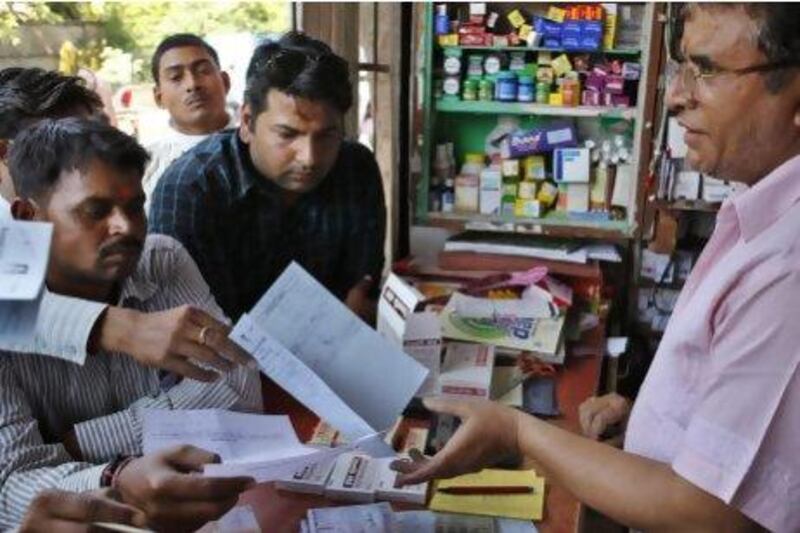NEW DELHI // Seriously ill patients in India and throughout the developing world may be treated for a tenth of the cost after a landmark ruling yesterday by the Indian supreme court that has global significance.
Judges threw out an attempt by the Swiss pharmaceutical giant Novartis to patent an updated version of the cancer drug Glivec. "A repetitive patent is not permissible on the same drug," the judges ruled.
Campaigners for low-cost health care hailed the judgment, but Novartis and intellectual-property lawyers cautioned that it risked driving pharmaceutical multinationals out of India and curbing the development of new medicines.
The ruling is important worldwide because India's Dh95 billion generic drug industry supplies much of the cheap medicine used in the developing world. It would be seriously restricted if Indian law allowed global drug companies to extend the lifespan of patents by making minor changes to medicines.
Once a drug's patent expires, generic manufacturers can legally produce it. They are able to make drugs at a fraction of the original manufacturer's cost because they do not carry out the expensive research and development.
The Indian generic drug manufacturer Cipla, for instance, makes a version of Glivec for less than a tenth of the original's selling price, which is at least 120,000 rupees (Dh8,135) for a month's supply.
"This is a big day for us," said Kiran Hukku, director of the Delhi branch of the non-profit Cancer Patients Aid Association. "Last year, we were able to supply only 5,000-odd doses of Glivec to people we were helping. This year, with more generics, I'm sure we'll do much better."
Glivec was the Swiss company's bestselling drug last year, with sales worth about Dh17bn. Novartis has been fighting for the patent since 2006, and lost two lower-court appeals along the way.
India's courts and patent offices have, in the recent past, concentrated on enabling cheaper versions of blockbuster drugs to come on to the market.
Last year, Natco Pharma, which manufactures a generic version of Glivec, was allowed to analyse Bayer AG's Nexavar, another anti-cancer drug. Also last year, Pfizer, Roche and Merck lost patents on various drugs in their stables on the ground that they were not sufficiently innovative.
Novartis seemed to have expected the court's decision to go against it. Last week, Paul Herrling, head of tropical disease research at Novartis, said: "Looking at recent cases, the mood in India makes it more likely that we would have a more negative response."
The Glivec case has reflected the larger debate in pharmaceuticals, of public interest versus intellectual property rights.
Medecins Sans Frontieres, the international medical charity, said before the verdict that a Novartis victory would ensure that "more and more treatments will remain priced out of reach for the duration of the patent term - 20 years or more - including those that are merely new forms of existing medicine and didn't deserve a patent in the first place."
In the short run, the benefits of lower drug costs are clear in India, where about 400 million people live below the globally accepted poverty line.
However, Saikrishna Rajagopal, an intellectual-property lawyer in New Delhi, said: "There's a great deal of concern in the industry that we're granting a premium to what is essentially copying."
Mr Rajagopal pointed out that, in a country such as the United States, a drug company could win swift relief and financial damages if its patent were infringed. In India, he said, cases dragged on for years, during which time local companies made their money by selling generics.
At the end of the litigation, even if the company won its claim, it received no financial damages. "There's no culture of awarding damages here. There's no treasure chest at the end of the rainbow."
As a result, he said, small drug manufacturers, instead of investing in research and development, are content to just make generics, often of poor quality.
But Ms Hukku said the Cancer Patients Aid Association had been happy with the quality of cancer generics. "The government's quality control process is quite good," she said.
Aditya Dev Sood, founder and chief executive of the Centre for Knowledge Societies in New Delhi, which consults on innovation, said it was a myth that patent-based protections were the "only way to incentivise innovation".
"The health of the public is both a public and a private good, which may merit special protections and exceptions," Mr Sood said.
"Moreover, it is an area where our ethical obligations to one another as fellow humans may have to trump existing legal standards, including intellectual property protections."
[ ssubramanian@thenational.ae ]
twitter: For breaking news from the Gulf, the Middle East and around the globe follow The National World. Follow us





